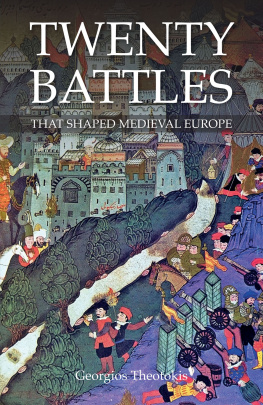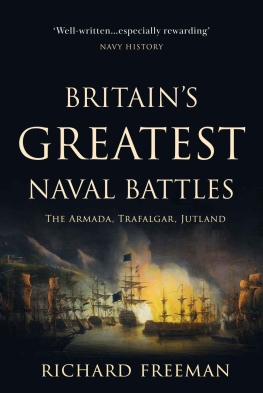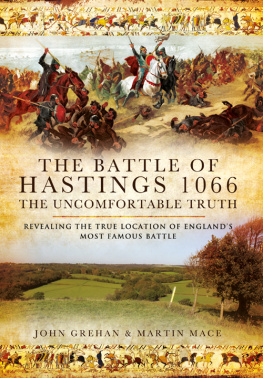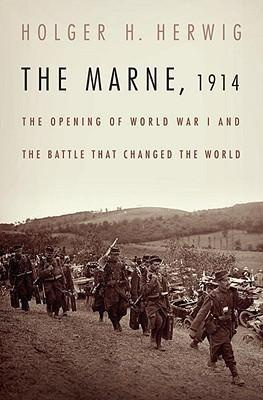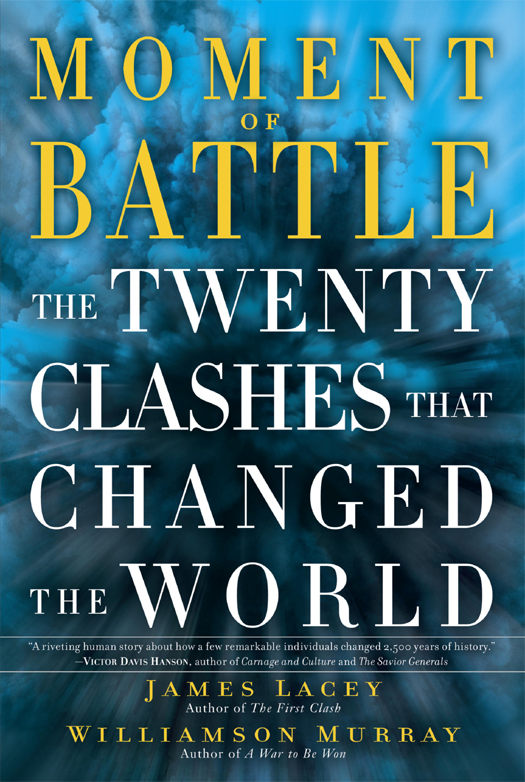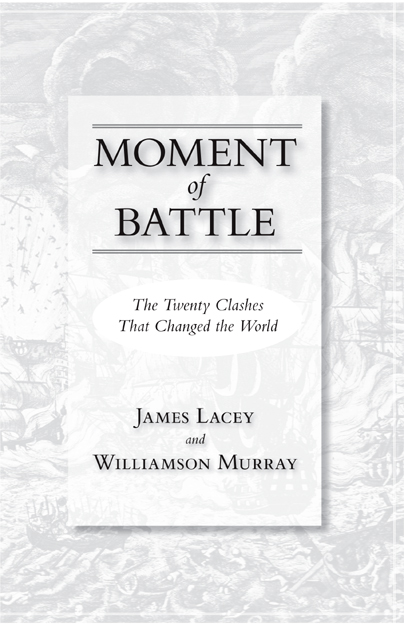Copyright 2013 by James Lacey and Williamson Murray
All rights reserved.
Published in the United States by Bantam Books, an imprint of The Random House Publishing Group, a division of Random House, Inc., New York.
B ANTAM B OOKS and the rooster colophon are registered trademarks of Random House, Inc.
Maps by Dave Merrill
LIBRARY OF CONGRESS CATALOGING-IN-PUBLICATION DATA
Lacey, James.
Moment of battle: the twenty clashes that changed the world / James Lacey and Williamson Murray.
p. cm.
Includes bibliographical references.
eISBN: 978-0-345-52699-1
1. Battles. 2. Military history. 3. Military art and scienceHistory.
I. Murray, Williamson. II. Title.
D25.5.L27 2013 355.0209dc23 2012034481
Printed in the United States of America on acid-free paper
www.bantamdell.com
246897531
Jacket design: Carlos Beltrn
Web asset credit: Excerpted from Moment of Battle by James Lacey and Williamson Murray, copyright 2013 by James Lacey and Williamson Murray. Published by Bantam Books, an imprint of The Random House Publishing Group, a division of Random House, Inc., New York.
v3.1_r1
CONTENTS
INTRODUCTION
L EON T ROTSKY, ONE OF THE MORE COMPETENT PRACTITIONERS OF THE art of war, is reputed to have commented that you may not be interested in war, but war is interested in you. Nevertheless, over the past several decades, the whole trend in American academic history seems to be moving in the opposite direction. Its fundamental mantra appears to be that wars and military and strategic history are irrelevant to the study of the past, which should instead involve the study of great sweeping social movements and factors other than military power. The adherents of this approach have their point, because the study of pure military history and battles, divorced from their political and social context, can perhaps seem not only arcane but unmoored from the very events that precipitated them and gave them meaning. Moreover, todays academics also argue that the so-called great men of history have in fact played minor roles in the ultimate flow of pivotal events. In other words, battles, wars, generals, and statesmen are simply the colorful but materially insignificant blips on the radar screen of any serious analysis of historical change. Yet it is the contention of the authors of this volume, who have seen war all too closely, that wars and battles have had a direct and massive impact on the course of history, one that is essential to understanding the world in which we live. We suspect the reader may agree with us.
For all of the intriguing insights of the wider academic analysis of the deep and complex currents that run through history, wars and battles have turned the course of human events in fundamentally new directions. In fact, the impact of military factors has changed the course of history not only in the short term, but in the long term as well. However, there are dangers when one removes war and battles from the cultural context in which they take place. The Battle of Cannae, the great clash between Hannibals Carthage and the Roman Republic, is a particularly good example. Few battles in history have attracted as much interest from a spectrum of individuals ranging from military historians to strategists. By the end of that gruesome day in 216 B.C. , some fifty thousand Romans lay dead on a blood-soaked plain in southern Italy. Yet what did Hannibals victory achieve? Rome did not collapse. Though seriously wounded, the Republic continued to produce legions one after another and to challenge the Carthaginians throughout the western Mediterranean as well as in Italy and eventually on their home ground.
The only significant result of Cannae was that it allowed Hannibal and his army to remain in Italy for another decade, a troublesome factor for the Romans but one that failed to shake their resolve. In the end, Scipios legions invaded North Africa and forced Carthage to recall Hannibal to defend his city. The resulting Battle of Zama then led to his defeat and the establishment of Roman hegemony over the Mediterranean that lasted for over half a millennium.
In deciding what battles to include in this volume, the authors have followed the direction set out by Edward Creasy in his classic study, Fifteen Decisive Battles of the World: There are some battles which claim our attention on account of their enduring importance, and by reason of their practical influence on our own social and political condition, which we can trace up to the results of those engagements. They have for us an abiding and actual interest by which they have helped to make us what we are; and also while we speculate on what we probably should have been, if any one of those battles had come to a different termination. In other words, like Creasy, we have selected our battles on the basis of their long-term impact on the course of history, not on the basis of their importance to the study of military art. Thus, Napoleons most decisive victories, Austerlitz and Jena-Auerstedt, have no place in our volume, because they failed utterly to achieve Napoleons aim of creating a French hegemony over the European Continent. So too neither Crcy nor Agincourt, despite the impressive killing power of the longbow, managed to achieve anything other than short periods of English domination in France.
Battles that have piqued our interest are particularly those that still reverberate down through the ages. And that in turn has forced us to delve into the precarious game of counterfactual history. In other words, had the outcome been different, would it have turned the course of the future in substantially different directions? The Battle of Hastings is a case in point, because William the Conquerors victory tied England closely to the Latin West. Moreover, the subsequent amalgamation of the Saxon and Norman cultures resulted in the creation of the English language. Ironically, in strictly military terms King Harolds victory at Stamford Bridge a few weeks earlier than the Battle of Hastings was far more decisive. But Stamford Bridge remains a mere footnote in history, while the long-term impact of Hastings continues to reverberate in the current world. That, of course, did not stop the British Labour Party in 1933 from passing a resolution, the thrust of which was that war had never changed anything in human history, despite the fact that its annual conference was meeting near the site of the battle.
As with much of history that attempts to ask the larger questions, our choices of those battles that we believe to have been decisive are idiosyncratic. Yet, for example, the first five battles in our list provide a clear indication of what we mean by decisive:
1. M ARATHON Made possible the continued existence of a distinct Greek civilization and culture, exemplified by Periclean Athens in succeeding decades.
2. G AUGAMELA Led to the creation of the Hellenistic world, which in turn proved crucial to the spread of Christianity.
3. Z AMA Broke the economic and political power of Carthage forever and made Rome the dominant power in the Mediterranean for the next five centuries.
4. T EUTOBURGER W ALD Placed a limit on Roman expansion and created the Latin-German divide that has plagued European peace over the course of the past two millennia.
5. A DRIANOPLE Marked the beginning of the collapse of the western half of the Roman Empire and ended a five-hundred-year period of the military and strategic domination by the Roman army.


